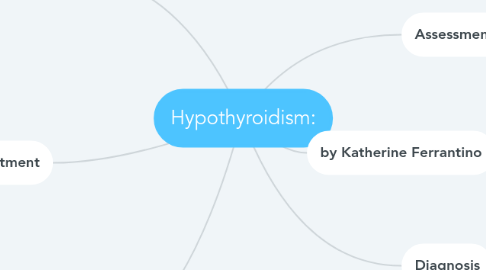Hypothyroidism:
da Katherine Taylor


1. Complications
1.1. Goiter: Constant stimulation of your thyroid to release more hormones may cause the gland to become larger
1.2. Myxedema: result of long-term, undiagnosed hypothyroidism
1.3. Heart problems: Hypothyroidism may also be associated with an increased risk of heart disease, primarily because high levels of low-density lipoprotein
2. Treatment
2.1. natural extracts containing thyroid hormone derived from the thyroid glands of pigs are available. These products contain both thyroxine and triiodothyronine. Synthetic thyroid medications contain thyroxine only, and the triiodothyronine your body needs is derived from the thyroxine.
2.2. daily use of the synthetic thyroid hormone levothyroxine
3. Etiology
3.1. autoimmune disease such as hashimotos
3.2. Radiation therapy
3.3. Medications
3.3.1. Medications such as lithium are known to affect the way the body produces thyroid hormones
3.4. Thyroid surgery
4. Assessment
4.1. Look for signs/symptoms that may include some of the following: fatigue, increased sensitivity to cold, dry skin, puffy face, thinning hair, muscle weakness, impaired memory or depression.
4.2. Check their weight and compare it to their previous weight taken at a prior appointment to see if there is any signs of weight gain.
5. Diagnosis
5.1. TSH blood test
5.1.1. Diagnosis of hypothyroidism is based on your symptoms and the results of blood tests that measure the level of TSH and sometimes the level of the thyroid hormone thyroxine. A low level of thyroxine and high level of TSH indicate an underactive thyroid. That's because your pituitary produces more TSH in an effort to stimulate your thyroid gland into producing more thyroid hormone.
